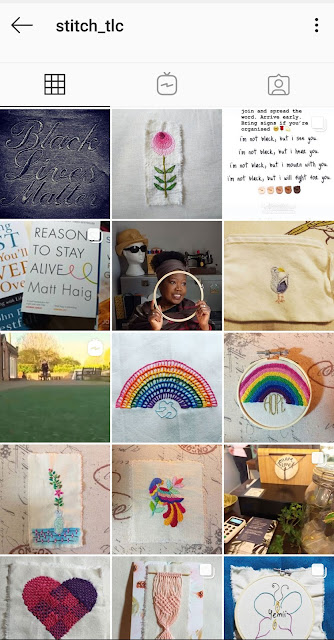How many Black embroidery artists do you know?
The theme of today's blog post is completely different than usual. I'm not from the US or Europe, I'm not black, I hardly ever talk to blacks in real life, and it seems like this isn't my problem ...
But I believe that racism, classicism and abuse of power are universal problems that exist everywhere in the world and that, unfortunately, they can take on such subtle forms that we don't even notice if we don't look closely.
So the victims have to talk about it particularly loudly.
read, donate, sign petitions
Only today I noticed that I don't know a single black embroiderer.
I still wonder why, how and what it means for me and the community, and I hope we all ask ourselves these questions.
The thoughts in my head are a little scattered, so I'll tell you point by point ...
1. Get to know these needlewomen first:
@Amber_LEA_Creates , @celiajayi , @crewel_therapy , @handmadebyregina , @lavyStch , @OSY_Creates , @PrettyStrangedesign , @ ravel.emboidery , @RavenKiannad_art , @SimoneLizeTHECTILTELYSeHeenstalkished @ _ _
And read what they say:
2. Indifference and naivety
One of the subtle forms of racism is indifference. “It's not my problem”, “Nothing I do will change anything”, “We don't need to talk about it all the time”.
Another subtle form is ignorance and naivety: "Is it really that bad?" "I don't see the problem", "It's too far".
Both are forms of pride born of ordinary privilege, and both are just as dangerous as overt and direct personal forms of racism.
Because the indifference and ignorance of passers-by allows the oppressor to do what he wants.
3. Our privilege is not eternal
We can barely understand how black people feel. Because we have never experienced what they have.
But that's no reason to sit back and keep quiet.
Don't think for a second that the comfortable and safe world you live in will never collapse. God can shake and change our situation in a second, and then we will need support and a helping hand.
I say this because privilege blinds many people. You start to be indifferent to other people's problems, because you just don't understand them. You have never been in such a situation and in your right mind you will never find yourself in such a situation, so why should you care.
Unfortunately, no one is immune from oppression.
Perhaps the implementation will promote empathy.
4. The most important thing is long-term action
Changes may or may not occur throughout the day, but in any case, our duty is to keep working on ourselves and striving for the best.
So, in addition to raising money, signing petitions, and generally receiving the current "surge" of feelings, let's take some long-term action.
teach. I consider this program the best at the moment. There are plenty of free resources out there, and if your agenda is cluttered and hectic, White Fragility is available on the Amazon Kindle and should be a good first step.
Focus on the children. Children are the future. Let's take a look at the type of content they're consuming, listening, watching and NOT listening, and see what they already think about the race, what their neighbors, classmates already think, and so on. We advocate racism in front of children, even if they are members of our family.
I'll finish it here. Feel free to add resources and opinions in the comments below!






























